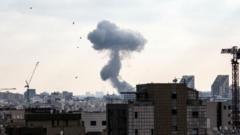In the wake of American military action against Iran's nuclear sites, Israelis are split in their reactions, with some viewing the strikes as a path to peace while others fear escalation into a prolonged conflict.
Divided Perspectives in Israel Following U.S. Military Action Against Iran

Divided Perspectives in Israel Following U.S. Military Action Against Iran
As Israel grapples with the aftermath of U.S. strikes on Iranian nuclear facilities, citizens express conflicting feelings of hope and fear about the future.
On June 22, 2025, Israelis faced a transformed reality following the United States' military engagement in their conflict with Iran, marked by a significant pre-dawn strike on three critical Iranian nuclear facilities. Emotions ran high as citizens were left to ponder the implications of these developments for their nation.
The sentiment among Israelis was notably mixed. Many expressed jubilance, seeing the U.S. intervention as a turning point that could usher in a new era of peace and diminish the looming threat posed by a nuclear-capable Iran. Meanwhile, a considerable number of citizens harbored concerns that American involvement could provoke a fierce Iranian response, leading to an extended military confrontation.
This divide in perception was evident in various sectors of society, spanning political affiliations and familial relationships. Supporters and critics of both President Trump and Israeli Prime Minister Benjamin Netanyahu discussed the potential consequences amidst shared experiences of seeking safety in bomb shelters.
In the early hours following the U.S. strikes, Iran retaliated with missile attacks, prompting millions of Israelis to rush for cover while the Israeli Air Force retaliated against Iranian targets. Despite the tumultuous circumstances, some prominent political figures, such as Yair Lapid, head of the opposition, acknowledged the historical significance of the events. He extended his gratitude toward Trump for the military action, framing the moment as one that could potentially render Israel and the wider region more secure.























